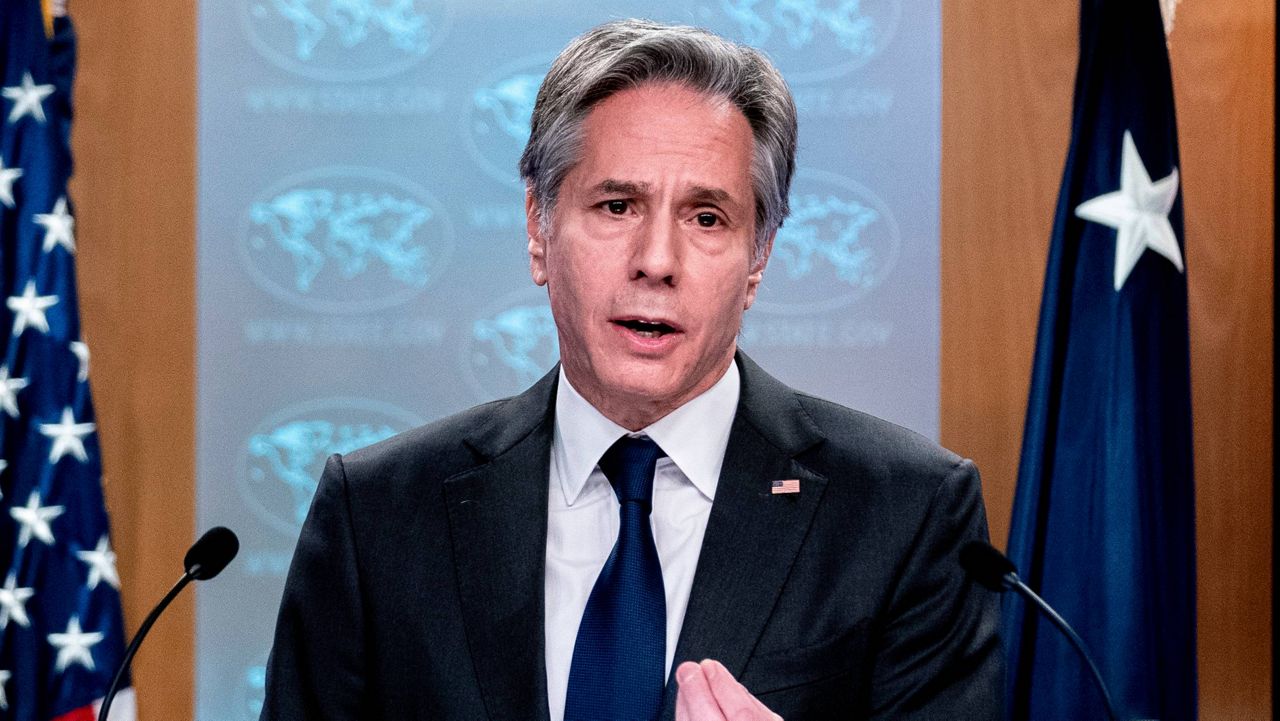The Biden administration is aiming to lead the international bloc opposed to Russia's invasion of Ukraine into a broader coalition to counter what it sees as a more serious, long-term threat to global order from China.
What You Need To Know
- The Biden administration is aiming to lead the international bloc opposed to Russia's invasion of Ukraine into a broader coalition to counter what it sees as a more serious, long-term threat to global order from China
- In a nearly 45-minute speech Thursday, Secretary of State Antony Blinken laid out a three-pillar approach to competing with Beijing in a race to define the 21st century's economic and military balance
- While the U.S. sees Russia as the most acute and immediate threat to international stability, Blinken called China “the most serious long-term challenge to the international order"
- Blinken reiterated that the U.S. policy on Taiwan has not changed, after President Joe Biden raised eyebrows earlier this week by saying the U.S. would act militarily to help Taiwan defend itself in the event of an invasion by China
In a nearly 45-minute speech Thursday to the Asia Society in Washington, Secretary of State Antony Blinken laid out a three-pillar approach to competing with Beijing in a race to define the 21st century's economic and military balance.
While the U.S. sees Russia as the most acute and immediate threat to international stability, Blinken called China “the most serious long-term challenge to the international order.”
Conceding that the U.S. has limited ability to directly influence China's intentions and ambitions, Blinken said, “We will shape the strategic environment around Beijing to advance our vision for an open, inclusive, international system.”
Blinken’s speech followed President Joe Biden's just-concluded visits to South Korea and Japan, where China loomed large in discussions.
Biden raised eyebrows during that trip when he said that the United States would act militarily to help Taiwan defend itself in the event of an invasion by China, which regards the island as a renegade province.
The administration scrambled to insist that Biden was not changing American policy, a point Blinken reiterated Thursday.
“The United States remains committed to our One China policy, which is guided by the Taiwan Relations Act,” Blinken said.
The policy recognizes Beijing but allows for unofficial links with and arms sales to Taipei.
Blinken touted the coalitions the U.S. has helped build not only in response to Russia’s invasion of Ukraine, but also in dealing with COVID-19, climate change, trade, human rights and cybersecurity.
The secretary of state said he did not expect partners to have the same views on China as the U.S. does.
“This is not about forcing countries to choose,” Blinken said. “It's about giving them a choice. so that for example, the only option isn't an opaque investment that leaves countries in debt, stokes corruption. harms the environment, fails to create local jobs or growth, and compromises countries’ exercise of their sovereignty.”
Blinken said, “China is the only country with both the intent to reshape the international order and, increasingly, the economic, diplomatic, military and technological power to do it.”
He added that China has become more repressive at home and aggressive abroad.
In addition to building an alliance, Blinken said the United States’ three-pronged plan for competing with Beijing includes greater investments in research and development, education, infrastructure and the workforce, and then protect itself against Chinese efforts to steal American innovation, including in the military, and work to ensure U.S. and Chinese companies are on an even playing field.
“We will fight for American workers and industry, with every tool we have, just as we know that our partners will fight for their workers,” Blinken said. “ ,,, We want trade and investment as long as they're fair and don't jeopardize our national security.”
In the latest manifestation of China's push to expand its reach that has drawn concern from the U.S. and other democracies, Chinese Foreign Minister Wang Yi on Thursday began an eight-nation tour of Pacific islands during which Beijing hopes to strike a sweeping agreement that covers everything from security to fisheries.
Wang opened his tour in the Solomon Islands, which last month signed a security cooperation pact with China that some fear could lead to a Chinese military presence there. The agreement was finalized shortly after the Biden administration announced it would open a U.S. embassy in the Solomons as part of its efforts to engage in the greater Indo-Pacific region.
The Biden administration has largely kept in place confrontational policies toward China adopted by its predecessor in response to Chinese actions in its western Xinjiang region, Hong Kong, Tibet and the South China Sea.
And, while the administration sees areas for working with Beijing, such as combatting climate change, it will not trade cooperation for compromising on its principles regarding human rights and rule of law, the officials said.



